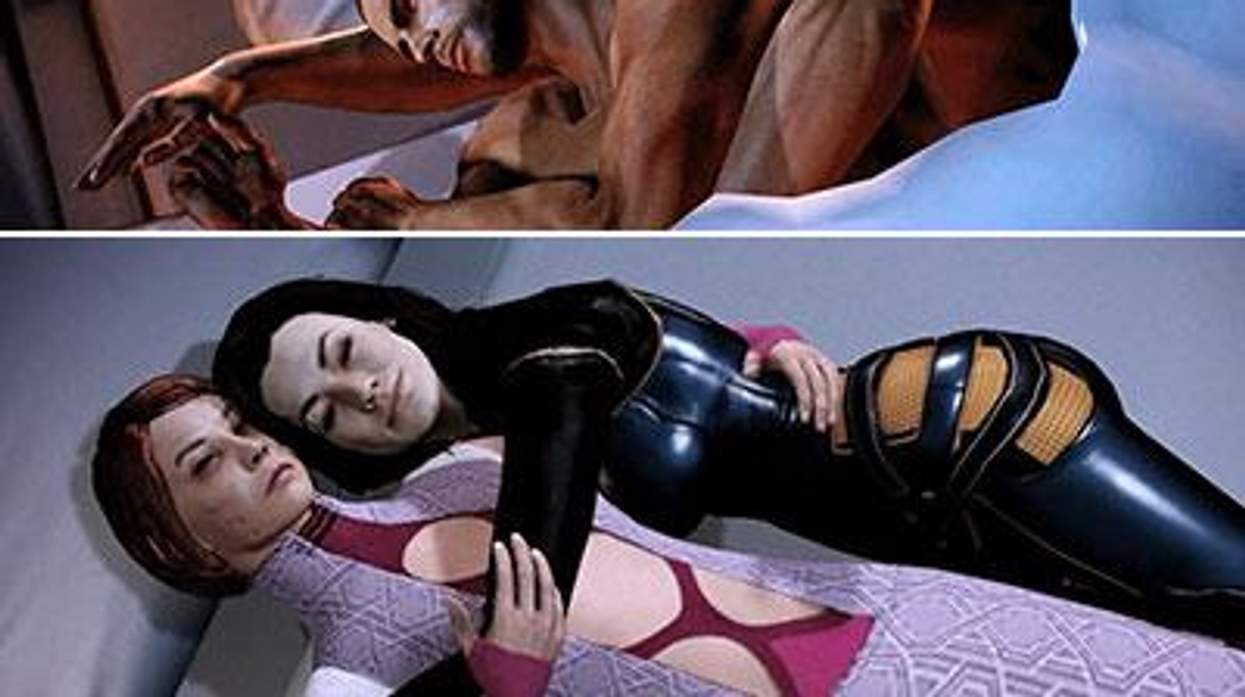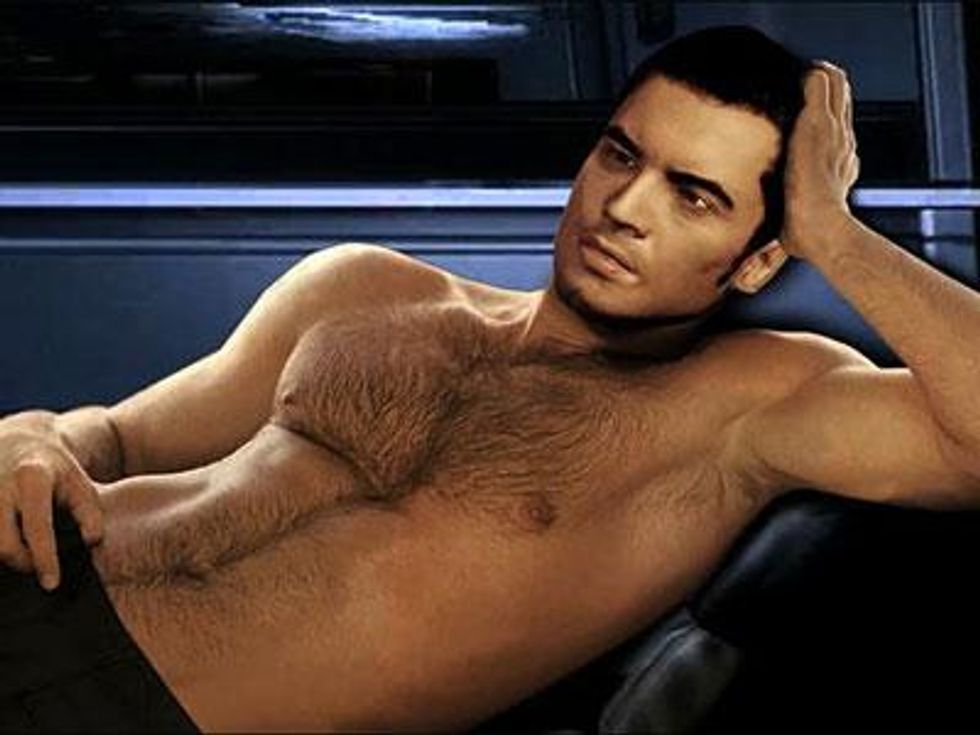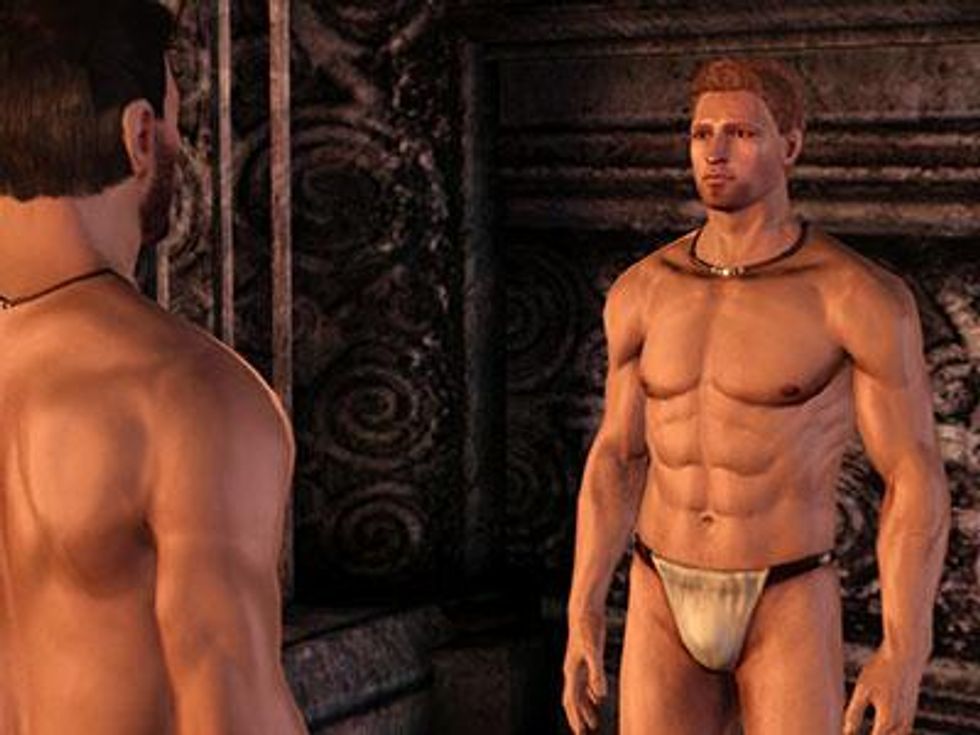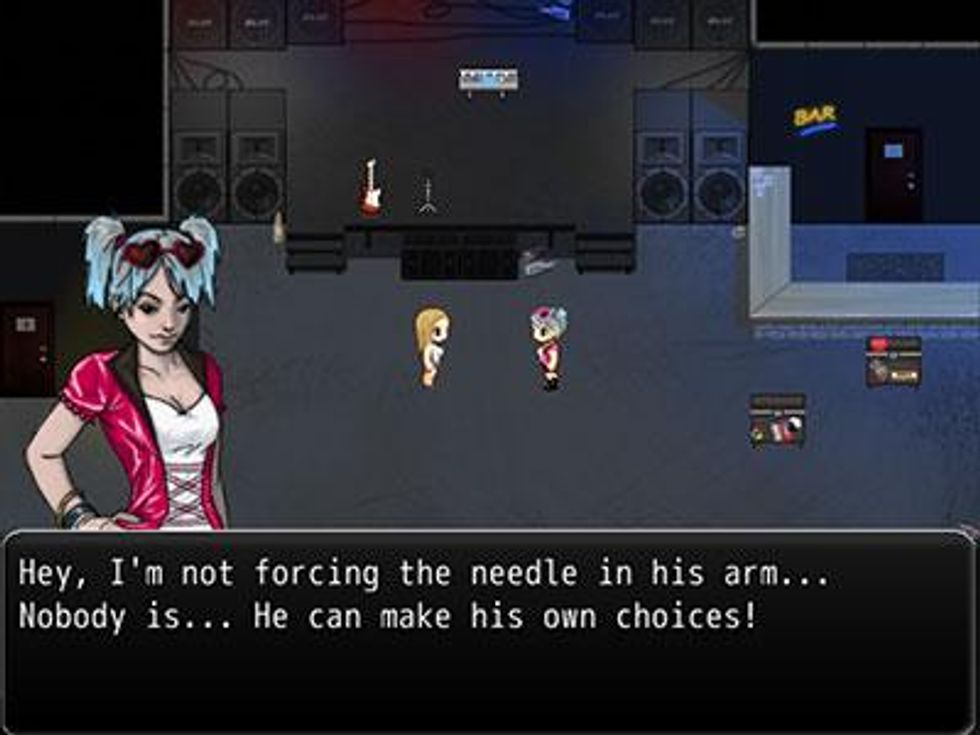Left and below: characters from Mass Effect
An unprecedented transformation in the video game world is under way, and it's touching everyone, from players to developers to scholars and critics. Nowhere has that change been more apparent than at Seattle's recent Penny Arcade Expo, the largest consumer-facing video game convention in the country.
Over the last year, Penny Arcade has experienced some tension in its relationship with LGBT fans. In June of 2013, cofounder Mike Krahulik stunned some readers when he tweeted, "Heads up if you use the word 'cis' save yourself some time and don't bother tweeting at me." He was trying to shut down a detractor who objected to the omission of trans people from games, but his tweets only stirred up more controversy: "If thinking that all women have a vagina makes me a monster than yes I am a monster," he also wrote.
To be fair, Krahulik had never previously directed hostility toward queerness, and he responded with interest and concern when a trans woman working within his organization expressed her dismay.
Facing ongoing criticism, he gradually grew more contrite. "My reaction when I feel backed into corner is to be an asshole," he wrote a few days later. "It's been that way since I was in elementary school. I'm 36 now. Maybe it's finally time to try and let some of that shit go." He went on to donate $20,000 to the Trevor Project, adding, "I realize I was wrong and I'm genuinely sorry."
The experience seems to have been an eye-opener for Penny Arcade management that they could do more for their queer fans. In December rumor got out that the next PAX convention would add a "Diversity Lounge," welcoming LGBT attendees. Some observers responded with skepticism, labeling it a "Diversity Ghetto" where queer gamers would be segregated.
 But when PAX East, a smaller version of the main PAX Prime event, rolled around in April, the Diversity Lounge was generally considered a success. Attendees who sought out the lounge found a comfortable space with a handful of booths, some beanbags for lounging, free swag. and a gender-neutral bathroom.
But when PAX East, a smaller version of the main PAX Prime event, rolled around in April, the Diversity Lounge was generally considered a success. Attendees who sought out the lounge found a comfortable space with a handful of booths, some beanbags for lounging, free swag. and a gender-neutral bathroom.
After the critical success of PAX East, organizers got to work on an updated and expanded Diversity Lounge.
When Diversity Lounge 2.0 launched at PAX Prime earlier this month, attendees found it situated in a high-traffic area frequented by thousands of convention-goers. Amid upbeat music, attendees chatted, played tabletop games, and engaged with others who passed by. It remained jam-packed throughout the convention, giving the event a +1 to diversity.
At one point, Mike Krahulik was warmly welcomed when he stopped by to play a board game.
"We could have a room by the escalators," explained organizer Ben Williams amid the hubbub, "but that felt too tucked-away."
PAX donated everything the Diversity Lounge needed, Williams said, from signs and tables to A/V equipment. None of the exhibitors were charged for their space.
That emphasis on inclusion mirrors a trend within the game industry. In past years, games have lagged behind other media when it comes to diversity. Queer characters are rare -- so rare, in fact, that when The Advocate conducted an informal survey of random convention attendees, about half couldn't name even one. But to their credit, attendees also expressed interest in seeing more.
"I'd like to see gay protagonists in games," said PAX attendee Mark Taylor. "I can't even think of any."
"There are a lot of inclusion problems," said Hunter Hughes, who was attending PAX with friends Morgan Want and Nathan Smith.
"Gaming is generally male-oriented, but it's changing," said Want. When asked if she would play a game as a queer character, she replied, "I would love that," and Hughes agreed: "That wouldn't turn me off."
Like the game community, developers have in recent years begun to include more women, people of color, and LGBT storylines.
Previously, players who weren't straight white men could have easily felt invisible and unwelcome in gaming culture. But with more diverse depictions, more people than ever now feel invited to join in.
 Assassin's Creed Liberation features a female person of color as the protagonist. Mass Effect allows players to choose a same-sex storyline. Dragon Age (left) recently added a gay mage.
Assassin's Creed Liberation features a female person of color as the protagonist. Mass Effect allows players to choose a same-sex storyline. Dragon Age (left) recently added a gay mage.
Of course, there are still only a handful of inclusive games from the high-budget industry leaders, generally referred to as "triple-A" developers.
"Triple-A is a slow ship to turn," says James Portnow, creator of the game criticism site Extra Credits. "But we've seen so much more inclusion, especially in the indie space, so many more games that feature female protagonists or LGBT characters. This is a topic that the industry wouldn't even approach four or five years ago."
That includes independent games like Always Sometimes Monsters, a love story in which the player's gender and race are randomly created, often resulting in mixed-race and same-sex relationships.
Then there's Social Dysphoria, a game in which players "dodge cisbots Innacurate [sic] Pronoun lasers while fighting through the Medical Referral levels and Psych visits teeming with dastardly Uneducated Doctors to reach the treasured Estrogen ampule/Testosterone vial at the top of the castle and save the world!"
This changing atmosphere has led some game journalists to wonder if the industry is witnessing "the end of gamers" -- that is, a redefinition of "gamer" away from the assumption of being a straight white male.
 Right: Sometimes Always Monsters
Right: Sometimes Always Monsters
Female critics and developers like Anita Sarkeesian and Zoe Quinn have spoken out publicly about the need for more inclusion and expanding the definition of what a game can be. They've been met with varying levels of enthusiasm by the industry and fellow gamers. (Sarkeesian's Kickstarter for a YouTube series about women in games sought $6,000, and fans wound up chipping in nearly $160,000.)
But like the Westboro Baptist Church, a few noisy critics are violently resisting any change. Both Sarkeesian and Quinn have recently had to leave their homes due to threats.
Tifa Robles, an organizer of Magic: The Gathering games for women, spoke on a panel at PAX about the problem of the vocal few who have resisted change within the game community. "They spent their whole lives being ostracized," she says. From their perspective, "now here come these women telling us we're doing everything wrong." But ultimately, Robles says, there's room for common ground amongst all players.
"Hey," she points out, "we've been ostracized too."
Efforts like the Diversity Lounge reflect a mega-evolution in the industry's attitude toward its fans and a realization that queer gamers have historically been excluded. That change is reflected in the fandom as well: As more queer gamers find their voice, there's been a growing acceptance among straight gamers. In essence, as players add more members to their parties, gaming in general is leveling up.
Most PAX attendees were glad to see the lounge -- even when they didn't realize it was there. When asked if they'd heard of the Diversity Lounge, Mandy Yasak and Jared Carmody said they hadn't. But then they started describing an area where queer developers were showing games, and it turned out that they'd visited and enjoyed the lounge without realizing it.
"We're reaching a tipping point in culture in general," actress Jennifer Hale told The Advocate at Pink Party Prime, an independent queer game-themed party organized Robert Roth and Charlie Logan.
Hale voiced the female version of Commander Shepard in the game Mass Effect, generally cited as an icon of inclusive game design. Players can select a male or female version of the character and opt for a same-sex romance in the game.
"So many people come up to me and they're so grateful to have a place to be who they are," she said. "And I'm like, it's about damn time."


 But when PAX East, a smaller version of the main PAX Prime event, rolled around in April, the Diversity Lounge was generally considered a success. Attendees who sought out the lounge found a comfortable space with a handful of booths, some beanbags for lounging, free swag. and a gender-neutral bathroom.
But when PAX East, a smaller version of the main PAX Prime event, rolled around in April, the Diversity Lounge was generally considered a success. Attendees who sought out the lounge found a comfortable space with a handful of booths, some beanbags for lounging, free swag. and a gender-neutral bathroom. Assassin's Creed Liberation features a female person of color as the protagonist. Mass Effect allows players to choose a same-sex storyline. Dragon Age (left) recently added a gay mage.
Assassin's Creed Liberation features a female person of color as the protagonist. Mass Effect allows players to choose a same-sex storyline. Dragon Age (left) recently added a gay mage. Right: Sometimes Always Monsters
Right: Sometimes Always Monsters

































































Charlie Kirk DID say stoning gay people was the 'perfect law' — and these other heinous quotes